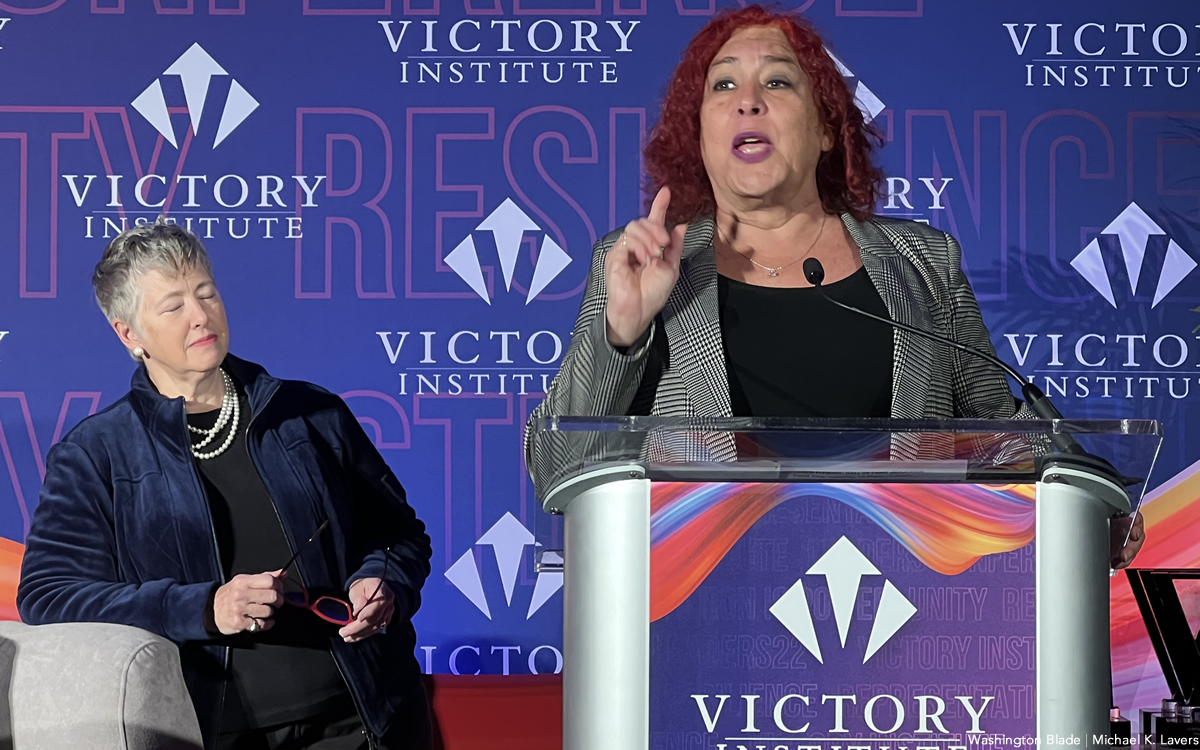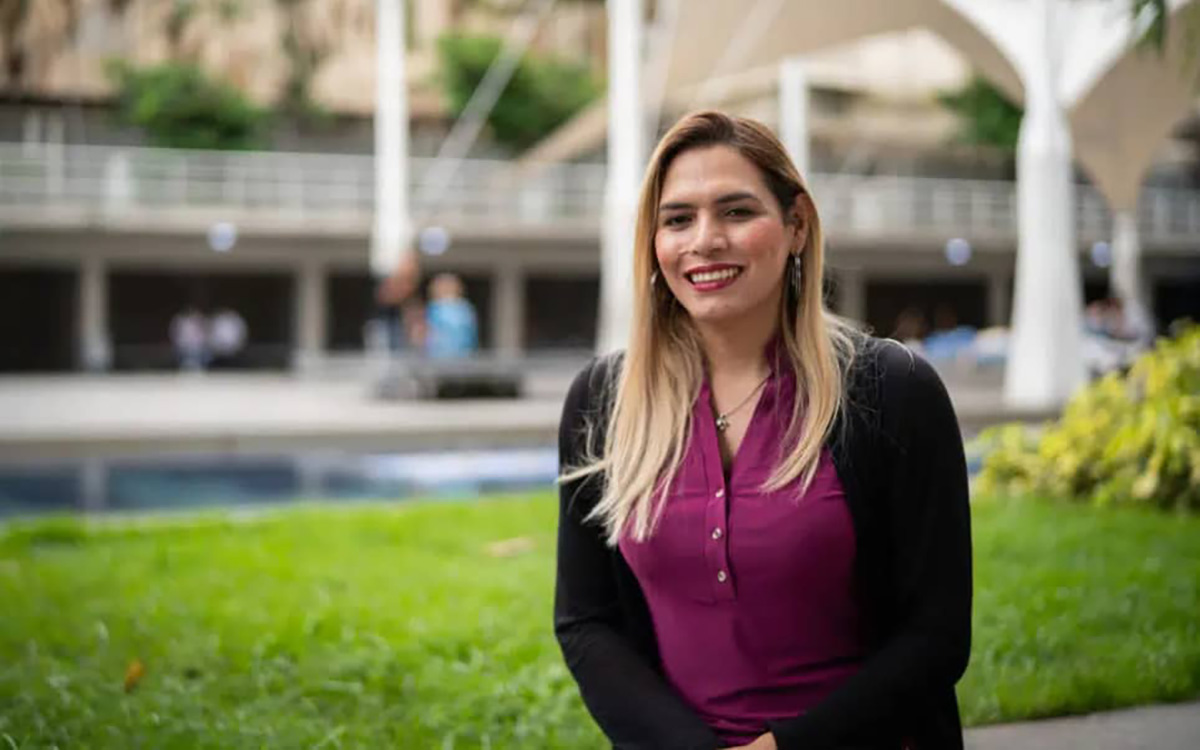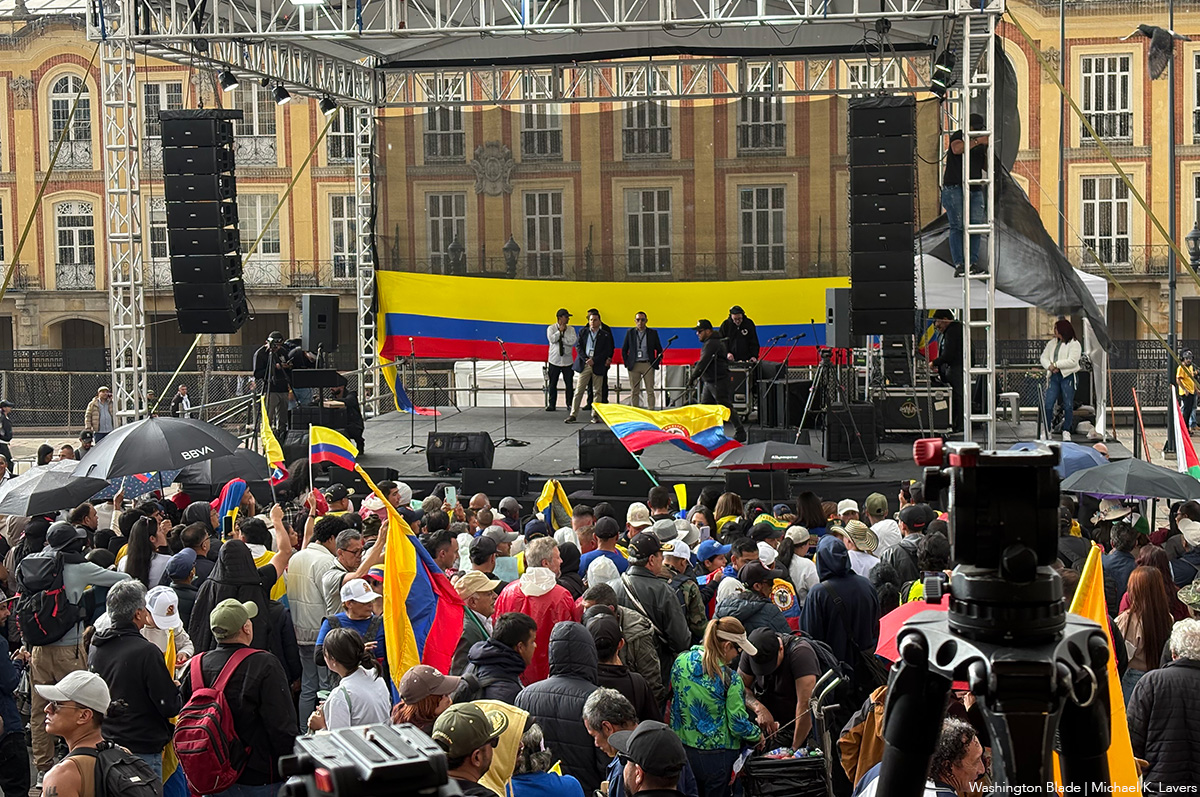South America
Nicolás Maduro declares victory in disputed Venezuelan presidential election
LGBTQ activists join opposition in denouncing irregularities

Venezuela’s National Electoral Council (CNE) on Sunday announced President Nicolás Maduro won a third term with 51.2 percent of the votes, compared to the 44.2 percent it said opposition leader Edmundo González received.
Fifty-nine percent of Venezuelans voted in the election that took place peacefully in most of the country, aside from reports of unrest in Táchira state that borders Colombia.
Authorities announced the results six hours after polling places closed, with CNE President Elvis Amoroso attributing the delay to a “terrorist” attack that affected data transmission. Maduro backed this explanation, suggesting a massive hacking of the electoral system took place.
The opposition, however, denounced irregularities and questioned the process’s transparency. Opposition leader María Corina Machado said she and her supporters have minutes that indicate González received 70 percent of the votes.
“There is a new president-elect and he is Edmundo González, and everybody knows it,” said Machado.
González entered into a political partnership with Machado, who Maduro’s government disqualified from holding public office. Machado backed González, a former diplomat.
“All regulations have been violated,” said González. “Our struggle continues.”
Maduro, for his part, called on his adversaries to abide by the results.
“This constitution must be respected,” said Maduro while speaking to supporters outside Miraflores Palace in Caracas, the Venezuelan capital, after the CSE declared him the winner. “The referee must be respected and no one must try to tarnish this beautiful day.”
In this regard, Tamara Adrián, the country’s first transgender congresswoman who ran in the presidential primary earlier this year, told the Washington Blade that “according to the information we have from the minutes that witnesses were able to obtain in approximately 40 percent of the polling stations, Edmundo González won with a percentage higher than 65 percent of the votes in all the states and in all the social sectors.”
The former congresswoman added “that is the result we had around 8 o’clock at night, when they started to issue instructions from the National Electoral Council for two things: One, to prohibit the entrance of Edmundo González’s witnesses in the vote counting room, something that continued during the whole night.”
“That is to say they never had any oversight from González in the computations,” Adrián told the Blade.
“And two, they prohibited the table chiefs from printing the minutes that the law says,” she added.

The elections took place amid widespread distrust of the CNE, whose board of directors includes figures linked to the ruling party.
The opposition questioned the electoral body’s impartiality and lack of recognized international observers. Reports indicate people in several areas of Caracas on Sunday used pots and pans to protest the CNE announcement.
LGBTQ activist Richelle Briceño told the Blade “the electoral participation in favor of change in the country was a majority and that will has been undoubtedly twisted by those who have dominated the electoral power and the armed forces of the nation.”
“They gave official results that do not adjust to reality and consequently are unverifiable,” said Briceño.

Chilean president, Biden-Harris administration question election results
Chilean President Gabriel Boric and other regional leaders expressed skepticism about the results.
American Secretary of State Antony Blinken also expressed concern about the count’s validity. Cuba and Honduras, on the other hand, congratulated Maduro after the CNE declared him the winner.
“The Maduro regime must understand that the results it publishes are hard to believe,” wrote Boric on his X account. “The international community and above all the Venezuelan people, including the millions of Venezuelans in exile, demand total transparency of the minutes and the process.”
“We are seriously concerned that the announced result does not reflect the will or the votes of the Venezuelan people,” said Blinken.
The situation in Venezuela remains uncertain, and the next few hours could define a new chapter in the country’s tumultuous political history.
“There is no certain formula for Maduro to leave the presidency while the other powers and institutions of the country are at his service,” said Briceño. “Venezuelans did what was in our hands, which was to express ourselves massively. Now we must continue to demand audited and verified results so that the truth is imposed before the world.”
“The support of the international community is fundamental for these purposes,” added Briceño.
Colombia
Gay Venezuelan opposition leader: Country’s future uncertain after Maduro ouster
Yendri Rodríguez fled to Colombia in 2024 after authorities ‘arbitrarily detained’ him

A gay Venezuelan opposition leader who currently lives in Colombia says his country’s future is uncertain in the wake of now former President Nicolás Maduro’s ouster.
The Washington Blade spoke with Yendri Rodríguez on Thursday, 12 days after American forces seized Maduro and his wife, Cilia Flores, at their home in Caracas, the Venezuelan capital, during an overnight operation.
Maduro and Flores on Jan. 5 pleaded not guilty to federal drug charges in New York. The Venezuelan National Assembly the day before swore in Delcy Rodríguez, who was Maduro’s vice president, as the country’s acting president.
Rodríguez, who lives in the Colombian capital of Bogotá, described the events surrounding Maduro’s ouster as “very confusing.”
“It was a very surprising thing that left me in shock,” Rodríguez told the Blade. “We also thought, at least from the perspective of human rights, that the United States was going to respect international law and not go to the extreme of bombing and extracting Maduro.”
“Other questions also arise,” he added. “What could have been done? What else could have been done to avoid reaching this point? That is the biggest question posed to the international community, to other countries, to the human rights mechanisms we established before Trump violated international law, precisely to preserve these mechanisms and protect the human rights of Venezuelan people and those of us who have been forced to flee.”
Rodríguez three years ago founded the Venezuelan Observatory of LGBTIQ+ Violence. He also worked with Tamara Adrián, a lawyer who in 2015 became the first openly transgender woman elected to the Venezuelan National Assembly, for more than a decade.
Members of Venezuela’s military counterintelligence agency, known by the Spanish acronym DGCIM, on Aug. 3, 2024, “arbitrarily detained” Rodríguez as he was trying to leave the country to attend a U.N. human rights event in Geneva.
Rodríguez told the Blade he was “forcibly disappeared” for nearly nine hours and suffered “psychological torture.” He fled to Colombia upon his release.
Two men on Oct. 14, 2025, shot Rodríguez and Luis Peche Arteaga, a Venezuelan political consultant, as they left a Bogotá building.
The assailants shot Rodríguez eight times, leaving him with a fractured arm and hip. Rodríguez told the Blade he has undergone multiple surgeries and has had to learn how to walk again.
“This recovery has been quite fast, better than we expected, but I still need to finish the healing process for a fractured arm and complete the physical therapy for the hip replacement I had to undergo as a result of these gunshots,” he said.

María Corina Machado, who won the 2025 Nobel Peace Prize, and other Venezuelan opposition leaders said Maduro’s government targeted Rodríguez and Peche. Colombian President Gustavo Petro and his government also condemned the attack.
Colombian authorities have yet to arrest anyone in connection with the attack.
Rodríguez noted to the Blade he couldn’t sleep on Jan. 3 because “of the aches and pains” from the shooting. He said a friend who is “helping me out and looking after my things” was the one who told him about the operation the U.S. carried out to seize Maduro and Flores.
“He said, ‘Look at this! They’re bombing Caracas! And I was like, ‘What is this?'” recalled Rodríguez.
White House ‘not necessarily’ promoting human rights agenda
Rodríguez noted Delcy Rodríguez “is and forms part of the mechanisms of repression” that includes DGCIM and other “repressive state forces that have not only repressed, but also tortured, imprisoned, and disappeared people simply for defending the right to vote in (the) 2024 (election), simply for protesting, simply for accompanying family members.” Yendri Rodríguez told the Blade that “there isn’t much hope that things will change” in Venezuela with Delcy Rodríguez as president.
“Let’s hope that countries and the international community can establish the necessary dialogues, with the necessary intervention and pressure, diplomatically, with this interim government,” said Yendri Rodríguez, who noted hundreds of political prisoners remain in custody.
He told the Blade the Trump-Vance administration does not “not necessarily” have “an agenda committed to human rights. And we’ve seen this in their actions domestically, but also in their dealings with other countries.”
“Our hope is that the rest of the international community, more than the U.S. government, will take action,” said Yendri Rodríguez. “This is a crucial moment to preserve democratic institutions worldwide, to preserve human rights.”
Yendri Rodríguez specifically urged the European Union, Colombia, Brazil, and other Latin American countries “to stop turning a blind eye to what is happening and to establish bridges and channels of communication that guarantee a human rights agenda” and to try “to curb the military advances that the United States may still be considering.”

Yendri Rodríguez told the Blade he also plans to return to Venezuela when it is safe for him to do so.
“My plan will always be to return to Venezuela, at least when it’s no longer a risk,” he said. “The conditions aren’t right for me to return because this interim government is a continuation of Maduro’s government.”
Editor’s note: International News Editor Michael K. Lavers was on assignment in Bogotá, Colombia, from Jan. 5-10.
Venezuela
AHF client in Venezuela welcomes Maduro’s ouster
‘This is truly something we’ve been waiting for’ for decades

An AIDS Healthcare Foundation client who lives in Venezuela told the Washington Blade he welcomes the ouster of his country’s former president.
The client, who asked the Blade to remain anonymous, on Thursday said he felt “joy” when he heard the news that American forces seized Nicolás Maduro and his wife, Cilia Flores, at their home in Caracas, the Venezuelan capital, during an overnight operation on Jan. 3.
“This is truly something we’ve been waiting for for 26 or 27 years,” the AHF client told the Blade.
Hugo Chávez became Venezuela’s president in 1999. Maduro succeeded him in 2013 after he died.
“I’ve always been in opposition,” said the AHF client, who stressed he was speaking to the Blade in his personal capacity and not as an AHF representative. “I’ve never agreed with the government. When I heard the news, well, you can imagine.”
He added he has “high hopes that this country will truly change, which is what it needed.”
“This means getting rid of this regime, so that American and foreign companies can invest here and Venezuela can become what it used to be, the Venezuela of the past,” he said.
The AHF client lives near the Colombia-Venezuela border. He is among the hundreds of Venezuelans who receive care at AHF’s clinic in Cúcuta, a Colombian city near the Táchira River that marks the border between the two countries.
The Simón Bolívar Bridge on the Colombia-Venezuela border on May 14, 2019. (Washington Blade video by Michael K. Lavers)
The AHF client praised U.S. President Donald Trump and reiterated his support for the Jan. 3 operation.
“It was the only way that they could go,” he said.
The Venezuelan National Assembly on Jan. 4 swore in Delcy Rodríguez, who was Maduro’s vice president, as the country’s acting president. The AHF client with whom the Blade spoke said he is “very optimistic” about Venezuela’s future, even though the regime remains in power.
“With Maduro leaving, the regime has a certain air about it,” he said. “I think this will be a huge improvement for everyone.”
“We’re watching,” he added. “The actions that the United States government is going to implement regarding Venezuela give us hope that things will change.”
Colombia
Colombians protest against Trump after he threatened country’s president
Tens of thousands protested the US president in Bogotá

BOGOTÁ, Colombia — Tens of thousands of people on Wednesday gathered in the Colombian capital to protest against President Donald Trump after he threatened Colombian President Gustavo Petro.
The protesters who gathered in Plaza Bolívar in Bogotá held signs that read, among other things, “Yankees go home” and “Petro is not alone.” Petro is among those who spoke.
The Bogotá protest took place four days after American forces seized now former Venezuelan President Nicolás Maduro and his wife, Cilia Flores, at their home in Caracas, the Venezuelan capital, during an overnight operation.
The Venezuelan National Assembly on Sunday swore in Delcy Rodríguez, who was Maduro’s vice president, as the country’s acting president. Maduro and Flores on Monday pleaded not guilty to federal drug charges in New York.
Trump on Sunday suggested the U.S. will target Petro, a former Bogotá mayor and senator who was once a member of the M-19 guerrilla movement that disbanded in the 1990s. Claudia López, a former senator who would become the country’s first female and first lesbian president if she wins Colombia’s presidential election that will take place later this year, is among those who criticized Trump’s comments.
The Bogotá protest is among hundreds against Trump that took place across Colombia on Wednesday.
Petro on Wednesday night said he and Trump spoke on the phone. Trump in a Truth Social post confirmed he and his Colombian counterpart had spoken.
“It was a great honor to speak with the president of Colombia, Gustavo Petro, who called to explain the situation of drugs and other disagreements that we have had,” wrote Trump. “I appreciated his call and tone, and look forward to meeting him in the near future. Arrangements are being made between Secretary of State Marco Rubio and the foreign minister of Colombia. The meeting will take place in the White House in Washington, D.C.”

-

 U.S. Supreme Court4 days ago
U.S. Supreme Court4 days agoSupreme Court hears arguments in two critical cases on trans sports bans
-

 Opinions5 days ago
Opinions5 days agoTeam Rayceen’s hiatus is officially over
-

 U.S. Military/Pentagon5 days ago
U.S. Military/Pentagon5 days agoHRC holds retirement ceremony for ousted transgender servicemembers
-

 U.S. Supreme Court5 days ago
U.S. Supreme Court5 days agoAs Supreme Court weighs trans sports bans, advocate and former athlete speaks out



















